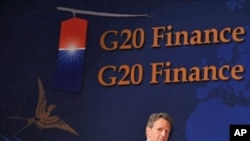A historic deal among the world's top 20 economies has been reached reforming the International Monetary Fund. Financial policy makers also agreed to avoid a currency war.
The agreement by the advanced and leading emerging economies will shake up the International Monetary Fund. Europe is to give up two of its nine chairs on the 24-seat executive board.
"It is a milestone in reforming global governance," said Olli Rehn, the chief for economic and monetary affairs of the European Commission.
IMF managing director Dominique Strauss-Kahn calls it "very historic" and the biggest-ever reform for the fund since its inception at the end of the Second World War.
Dynamic emerging economies and other under-represented countries, such as Brazil, China, India and Russia, are to control more than six percent of IMF voting rights by 2012.
In an effort to avert a possible trade war that could damage the global economic recovery, the Group of 20 members also pledged not to engage in tit-for-tat currency devaluations.
The meeting in Gyeongju took place just three weeks before the G20 summit of heads of governments in the South Korean capital, Seoul. U.S. Treasury Secretary Timothy Geithner says the Seoul summit needs to give force to what was agreed here.
"The challenges the leaders face are the ones that we discussed today," he said. "And what we want to see is the leaders review these proposals, review this framework and give it their full support."
Officials of the host nation say they want the Seoul meeting to implement a new economic order that will prevent any future fiscal crises from endangering the world's economy
Officials say the currency agreement emerged after an all-night negotiating session. It commits the G20 nations to "refrain from competitive devaluation of currencies" and allow markets, to primarily drive exchange rates.
The state of the U.S. dollar, weakened by a loose monetary policy, prompted some G20 countries, notably Brazil, Indonesia and South Korea, to intervene in the foreign exchange market recently to stem a surge of their currencies.
Strong currencies hurt a country's export competitiveness. China has rejected calls to increase the value of the yuan, which is effectively pegged to the dollar.
Host South Korea and the United States put forward a proposal to narrow the gap between what any G20 nation produces and invests and how much it consumes.
But a push for a binding numerical target of four percent of gross domestic product by 2015 was called unrealistic by Japan's finance minister, Yoshihiko Noda. Australia's treasurer, Wayne Swan, rejected what he called a "one size fits all" policy. Other members, such as China and Germany, also expressed reservations. They are among those who point the finger of blame at U.S. policies for the recent international financial crisis.
The current account proposal, however, would also force the United States to spend less while boosting its exports and savings.
The G20 ministers and bank governors also agreed on tougher rules for financial institutions blamed for triggering the global economic crisis.
Global Financial Policy Makers Agree to IMF Reform, Currency Pledge














